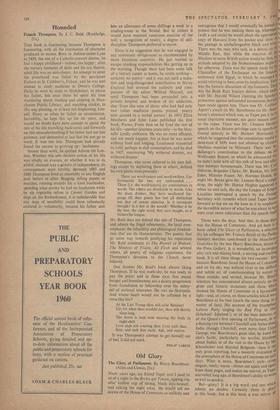Hounded
Francis Thompson. By J. C. Reid. (Routledge, 25s.)
Tuts book is fascinating because Thompson is fascinating, with all the fascination of character produced to excess. Born in Ashton-under-Lyne in 1859, the son of a Catholic-convert doctor, he had a happy childhood—indeed, too happy : after the nursery fantasies of dolls and his toy theatre, adult life was an anti-climax. An attempt to enter the priesthood was foiled by the percipient Fathers at St. Cuthbert's, Ushaw, and he was sent instead to study medicine at Owen's College. Daily he went by train to Manchester, to please his father, but once there he spent his time wandering about, reading and sleeping in Man- chester Public Library, and watching cricket, in this way pleasing, or at least not displeasing, him- self. Every so often he failed an examination. Incredibly, he kept this up for six years, and would no doubt have been content to spend the rest of his life travelling backwards and forwards on this misunderstanding if his father had not lost patience, and demanded at last that his son go to work. It was too late. Thompson had already found the answer to growing up: laudanum.
Sooner than work, he quitted Ashton for Lon- don. Whether this sole decisive action of his life was simply an evasion, or whether it was in its pitiful, maimed way a gesture of independence, its consequences were terrible. Between 1885 and 1888 Thompson lived as miserably as any English poet before or after. Begging, selling papers or matches, running errands for a kind bootmaker, spending what money he had on laudanum while he ate vegetable refuse in Covent Garden and slept on the Embankment, it is unbelievable that any man of sensibility could have voluntarily endured it—voluntarily, because his father sent
him an allowance of seven shillings a week to a reading-room in the Strand. But to collect, it would have required conscious exercise of the will, a recognition of reality, a degree of self- discipline. Thompson preferred to starve.
There is no suggestion that he was engaged in any systematic dereglement as recommended by more ferocious confreres. He just wanted to escape crushing responsibilities like getting up in the morning. Though there had been some talk of a literary career at home, he wrote nothing— certainly no poetry—and it was not until a tenta- tive and long-disregarded contribution to Merry England had aroused the curiosity and com- passion of the editor Wilfred Meynell, not until Thompson had been persuaded into a private hospital and broken of his addiction, that 'from this man of thirty who had had only two rather mediocre poems printed, poetry now poured in, a turbid torrent.' In 1893 Elkin Matthews and John Lane published his first book, Poems. From then on he lived the rest of his life—another fourteen years only—in the Mey- nells' kindly ambience. He was no more efficient, and not much happier, but at least he was never without food and lodging. Laudanum reasserted its hold, perhaps to dull consumption, and he died in 1907, murmuring 'My withered dreams, my withered dreams.'
Thompson, who never referred to his own fail- ings except by deploring them in others, defined his own poetic vices precisely : There are word-tasters and word-swillers. Un- fortunately the two are confounded. . . . These [i.e. the word-tasters] are connoisseurs in words. The others are drunkards in words. Like the dram drinker, they have swallowed lan- guage till their palate has lost all distinction but that of coarse stimulus. Is it intoxicant enough? Is it hot in the mouth? Whether it be the best, the right word, they care nought, so it blisters the 'tongue.
Mr. Reid does not defend this side of Thompson, and admits the frigid inhumanity, the lurid over- emphasis, the infantility and philological freakish- ness that are its characteristics. The poems that go some way towards justifying his reputation Mr. Reid nominates as The Hound of Heaven, The Mistress of Vision, All Flesh and several others, all poetry of religious experience, for Thompson's devotion to the Church never faltered.
One finishes Mr. Reid's book almost liking Thompson. If he was work-shy, he was ready to pay the price; and in those days that meant hunger and homelessness, not a dainty progression from foundation to fellowship over the safety- net of national insurance. He was no Skimpole. And whose heart would not be softened by a verse like this?
At the Last Trump thou wilt arise Betimes!
Up; for when thou wouldst not, thou wilt shortly sleep long.
The worm is even now weaving thy body its night-shift.
Love slept not a-saving thee. Love calls thee.
Rise, and seek him early. Ask, and receive.
It was Thompson's attempt to get himself out of bed. It did not work.
PHILIP LARKIN










































 Previous page
Previous page